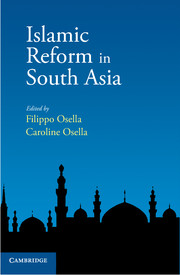Book contents
- Frontmatter
- Contents
- List of Contributors
- Introduction
- Part I Reformist Journeys
- Part II Debating Reform
- Part III Everyday Politics of Reform
- 11 Reading the Qur'an in Bangladesh: The Politics of ‘Belief’ Among Islamist Women
- 12 Cracks in the ‘Mightiest Fortress’: Jamaat-e-Islami's Changing Discourse on Women
- 13 Islamic Feminism in India: Indian Muslim Women Activists and the Reform of Muslim Personal Law
- 14 Disputing Contraception: Muslim Reform, Secular Change and Fertility
- Part IV Reform, State and Market
- Index
14 - Disputing Contraception: Muslim Reform, Secular Change and Fertility
from Part III - Everyday Politics of Reform
Published online by Cambridge University Press: 05 January 2014
- Frontmatter
- Contents
- List of Contributors
- Introduction
- Part I Reformist Journeys
- Part II Debating Reform
- Part III Everyday Politics of Reform
- 11 Reading the Qur'an in Bangladesh: The Politics of ‘Belief’ Among Islamist Women
- 12 Cracks in the ‘Mightiest Fortress’: Jamaat-e-Islami's Changing Discourse on Women
- 13 Islamic Feminism in India: Indian Muslim Women Activists and the Reform of Muslim Personal Law
- 14 Disputing Contraception: Muslim Reform, Secular Change and Fertility
- Part IV Reform, State and Market
- Index
Summary
During our first research in Jhakri, an exclusively Muslim village in Bijnor district (north-western Uttar Pradesh), the sterilization drive associated with the Emergency of 1975–77 was a recent memory. Our field-notes, then and subsequently, have repeatedly registered the conviction that using contraceptive techniques, especially sterilization [nasbandī or ‘tube closing’], is contrary to Islam. Recent surveys elsewhere in India indicate that 9 per cent of currently-married Muslim women—but only 1 per cent of Hindu and Christian women—say that their main reason for not intending to use contraception is because it is ‘against their religion’. For Bhat and Zavier (2005: 400), these figures reflect Muslims' slavish obedience to ignorant mullahs and account for most of the differences in contraceptive use between members of the three communities. Islamic doctrines are widely presumed to be central to Muslims' everyday lives. Superficially, Jhakri residents might seem to endorse this rarely examined or substantiated assumption, but leaving matters there would fall far short of adequately accounting for their fertility behaviour.
First we outline how several aspects of Muslim reformers' agendas might seem consistent with fertility limitation, yet the historical record provides no clear impression of their views on contraception. Further, the idea that Muslims slavishly follow a monolithic ‘Islamic doctrine’ ignores the contested and shifting understandings of contraception yielded by the same authoritative Islamic sources.
- Type
- Chapter
- Information
- Islamic Reform in South Asia , pp. 383 - 418Publisher: Cambridge University PressPrint publication year: 2013



